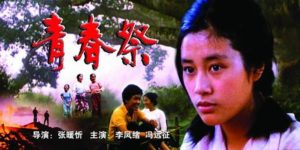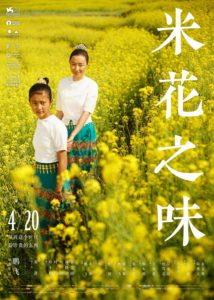Left Behind Buddha
米花之味
China, 2017, colour, 16:9, premiere version: 102 mins., release version: 94 mins.
Director: Pengfei 鹏飞 [Song Pengfei 宋鹏飞].
Rating: 4/10.
Bloodless, pretentious study of a mother and daughter in a Dai village in Yunnan province.
Mengka village, Yunnan province, southern China, near the Sino-Burmese border, the present day. Now divorced, Ye Nan (Ying Ze) returns to her home village after a long absence to spend time with her 11-year-old daughter Nan Hang (Ye Bule), whom she “left behind” in order to make money in Shanghai. A problem student at school, Nan Hang is withdrawn and uncommunicative with her mother, who in turn is treated almost like an outsider by the locals. Ye Nan’s father (Yang Zuojiu), who has been looking after Nan Hang, tells her to be more understanding with her daughter. Annoyed by the amount of time Nan Hang spends playing games on her mobile phone, Ye Nan deletes all of the apps. After being given detention by a teacher (Lin Xiaochu) for misbehaving, Nan Hang steals his mobile. Finally, after Nan Hang injures a boy who always gossiped about her at school, Ye Nan learns the full truth about her daughter’s truancy. However, Nan Hang’s rebellion continues, along with her best friend Nan Xianglu (Ye Men), spending a whole night out at an internet cafe in town and also stealing money from a temple’s donations. Exhausted, Ye Nan prepares to return to her life in Shanghai. But then Nan Xianglu suddenly falls ill with kidney failure and local superstition, which sees it as punishment for her stealing, does battle with medical common sense.
REVIEW
As in the first feature by Mainland-born, France-trained director Song Pengfei 宋鹏飞 (Underground Fragrance 地下•香, 2015), it’s the Taiwan d.p. – in this case Liao Benrong 廖本榕, longtime cinematographer for director Cai Mingliang 蔡明亮 – who emerges with the most credit in Left Behind Buddha 米花之味, an equally bloodless, pretentious excursion focused on a dysfunctional mother-daughter relationship in a Dai-minority village in Yunnan province, near the Sino-Burmese border. Translucently shot, and almost closer to an ethnic documentary than a human drama, the film shows Song has an eye for well-composed visuals but little else. Though not as grindingly static as a feature by Taiwan’s Cai (for whom Song worked as an assistant), it is equally empty of emotional thrust and any kind of content beyond the obvious.
Song, 35, spent a year living among the Dai people, and his absorption into their village culture is reflected by the attention to detail, rendered in an immaculately exotic way beloved of French film-makers. His lead actress (and this time, co-writer) is again 20-something Ying Ze 英泽, born in Beijing, raised in Hong Kong, and with higher education in the UK (at the London School of Economics & Political Science) and US (philosophy at Harvard University). With her striking looks – largely Han Chinese, but with some ethnic-minority blood – Ying looks the part of a young Dai woman who returns to her village after a long spell (and a broken marriage) away in Shanghai to repair her relationship with her 11-year-old daughter, one of several “left behind” children in the border village.
Unfortunately, as she also proved by her performance as a listless pole dancer-cum-job seeker in the Beijing-set Fragrance, Ying is no actress – at least within the confines of Song’s films so far: her delivery of the awkward dialogue is stiff and there’s no mother-daughter chemistry, even of a troubled kind. As the kid who expresses her unhappiness by playing computer games and petty thieving rather than school studies, Ye Bule 叶不勒 is the more involving of the pair – though neither make the sudden repair of the mother-daughter relationship convincing.
The script touches on matters like “left behind” village children (much better handled by the touchingly offbeat Sunlight at Fingertips 指尖太阳, 2012), the economic need for tourism, and religious superstition vs modern-day life and medicine; but it all adds up to a  thimbleful of content in a series of beautifully shot tableaux. As a Dai-centred drama, it doesn’t hold a candle to the classic Sacrifice of Youth 青春祭 (1985), written and directed by Zhang Nuanxin 张暖忻 during the great flowering of rural stories by the so-called Fifth Generation of film-makers (see poster, left).
thimbleful of content in a series of beautifully shot tableaux. As a Dai-centred drama, it doesn’t hold a candle to the classic Sacrifice of Youth 青春祭 (1985), written and directed by Zhang Nuanxin 张暖忻 during the great flowering of rural stories by the so-called Fifth Generation of film-makers (see poster, left).
Editing of the generally static visuals, supervised by veteran Chen Bowen 陈博文 (one of many Taiwan key crew), is smooth and not bottom-achingly slow, and occasional ethnic-flavoured music by Japanese veteran Suzuki Keiichi 铃木庆一 (Zatoichi 座头市, 2003) and Dai musician Cha Ainan 茶爱南 (who also plays a monk-turned-social worker) add delicate atmosphere. However, the whole film, from the careful compositions to laundered clothes, is too clean and lifeless to involve the viewer. Flashes of sardonic observational humour hint at a more interesting movie.
Mainland box office was a suitably puny RMB2 million. After premiering at China’s First Film Festival in summer 2017, and then internationally that autumn in the Venice Film Festival’s Venice Days section, the film was cut by eight minutes, given a new English title (The Taste of Rice Flower, translating the Chinese title) and copyrighted 2018.
CREDITS
Presented by Shanghai Uniglobe Film & Culture (CN).
Script: Pengfei [Song Pengfei], Ying Ze. Photography: Liao Benrong. Editing: Chen Bowen, Weng Yuhong. Music: Suzuki Keiichi, Cha Ainan. Art direction: Liao Huili. Styling: Wang Jiahui. Sound: Chen Yujie, Du Duzhi, Wu Shuyao. Choreography: Cha Aini. Executive direction: Wang Zijie.
Cast: Ying Ze (Ye Nan), Ye Bule (Nan Hang), Ye Men (Nan Xianglu), Ye Pin (Ye Pin), Lin Xiaochu (Lin, teacher), Cha Ainan (Heying Wang), Zha Zongfang (mountain-god granny), Yang Zuojiu (Ye Nan’s father).
Premiere: First Film Festival (Competition), Xining, China, 23 Jul 2017.
Release: China, 20 Apr 2018.
